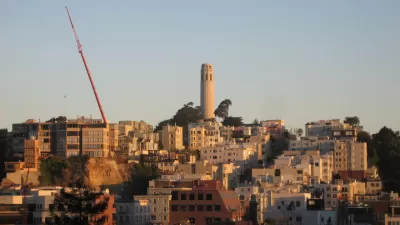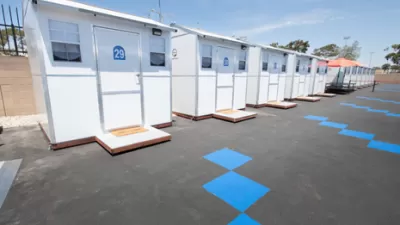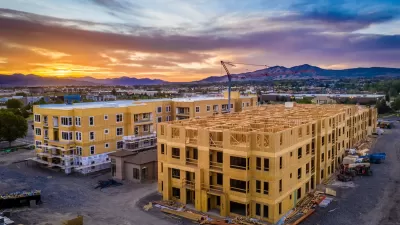Few in Los Angeles have the opinion that the lack of housing supply is driving the homeless crisis in the city and around the state.

The Los Angeles Times surveyed Californians about what they thought was driving the state’s homeless crisis, and many who work on the issue were surprised by the results. "Only 13 percent of respondents blamed the crisis on 'too little homebuilding.' Twice as many people included 'lack of funding for affordable housing' or 'lack of rent control' as top explanations for the problem," Rick Jacobus writes for Shelterforce. This seems counter to the basic principles of economics. 'Both in the comments section on the LA Times website and on Twitter, commenters wondered what it was about supply and demand that voters can’t quite understand,' Jacobus writes.
Jacobus argues that, while increased supply should be part of the strategy, the story is more complicated than that. Jacobus contends that housing is composed of many distinct commodities and changing the supply of luxury apartments is unlikely to impact costs for some people on the lower end of the market. He goes even further, writing: "My view is that there are sensitive neighborhoods where fancy new buildings can accelerate gentrification, but there are also many more neighborhoods where that is not much of a risk."
To make a dent in housing costs Jacobus argues: "The most compelling policy implication of this switch to a segmented view of housing markets is that we need to do more to encourage development of new buildings that are targeted for lower- and middle-income households." In Jacobus’ view, voters don’t believe that developers and the free market will solve the housing crisis, so to make a more compelling case for development, politicians must be willing to hold private partners to their promises when it comes to building affordable housing and must be honest about the challenges presented by working with these partners.
FULL STORY: Why Voters Haven’t Been Buying the Case for Building

Alabama: Trump Terminates Settlements for Black Communities Harmed By Raw Sewage
Trump deemed the landmark civil rights agreement “illegal DEI and environmental justice policy.”

Planetizen Federal Action Tracker
A weekly monitor of how Trump’s orders and actions are impacting planners and planning in America.

The 120 Year Old Tiny Home Villages That Sheltered San Francisco’s Earthquake Refugees
More than a century ago, San Francisco mobilized to house thousands of residents displaced by the 1906 earthquake. Could their strategy offer a model for the present?

Ken Jennings Launches Transit Web Series
The Jeopardy champ wants you to ride public transit.

BLM To Rescind Public Lands Rule
The change will downgrade conservation, once again putting federal land at risk for mining and other extractive uses.

Indy Neighborhood Group Builds Temporary Multi-Use Path
Community members, aided in part by funding from the city, repurposed a vehicle lane to create a protected bike and pedestrian path for the summer season.
Urban Design for Planners 1: Software Tools
This six-course series explores essential urban design concepts using open source software and equips planners with the tools they need to participate fully in the urban design process.
Planning for Universal Design
Learn the tools for implementing Universal Design in planning regulations.
Clanton & Associates, Inc.
Jessamine County Fiscal Court
Institute for Housing and Urban Development Studies (IHS)
City of Grandview
Harvard GSD Executive Education
Toledo-Lucas County Plan Commissions
Salt Lake City
NYU Wagner Graduate School of Public Service





























